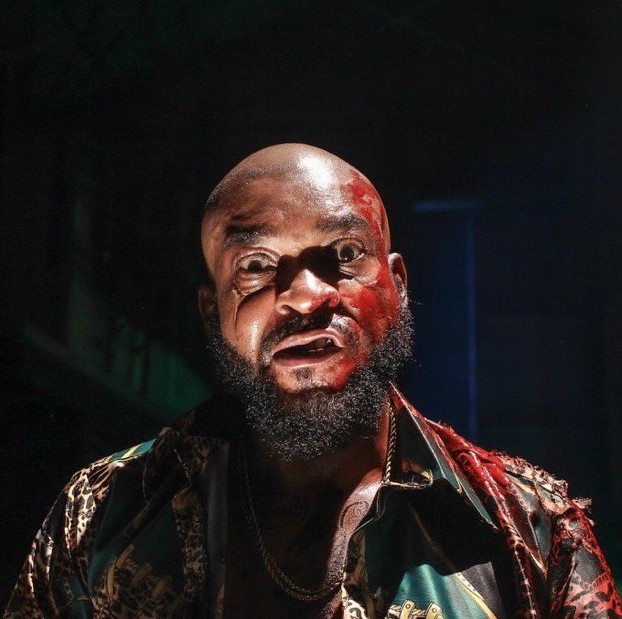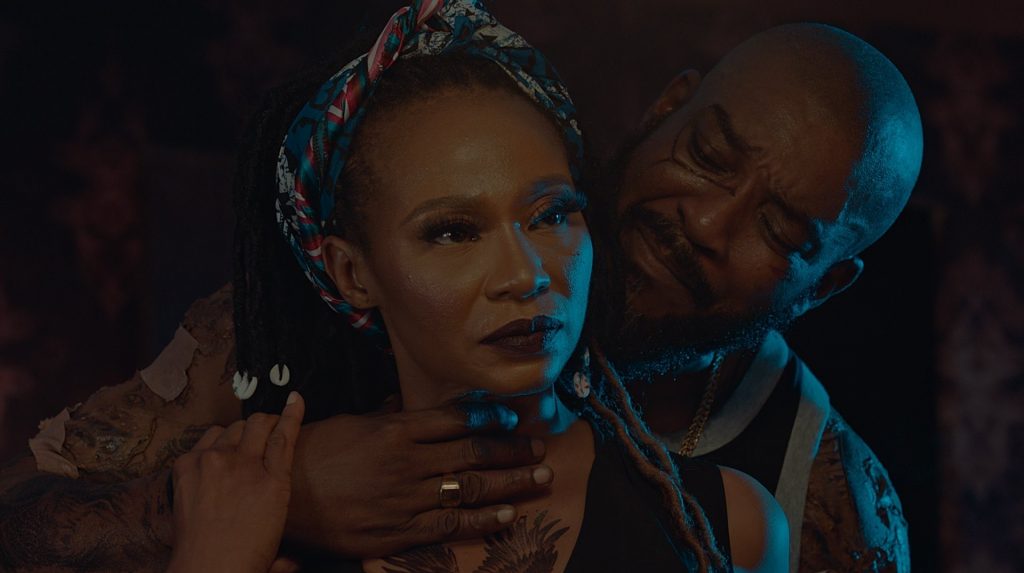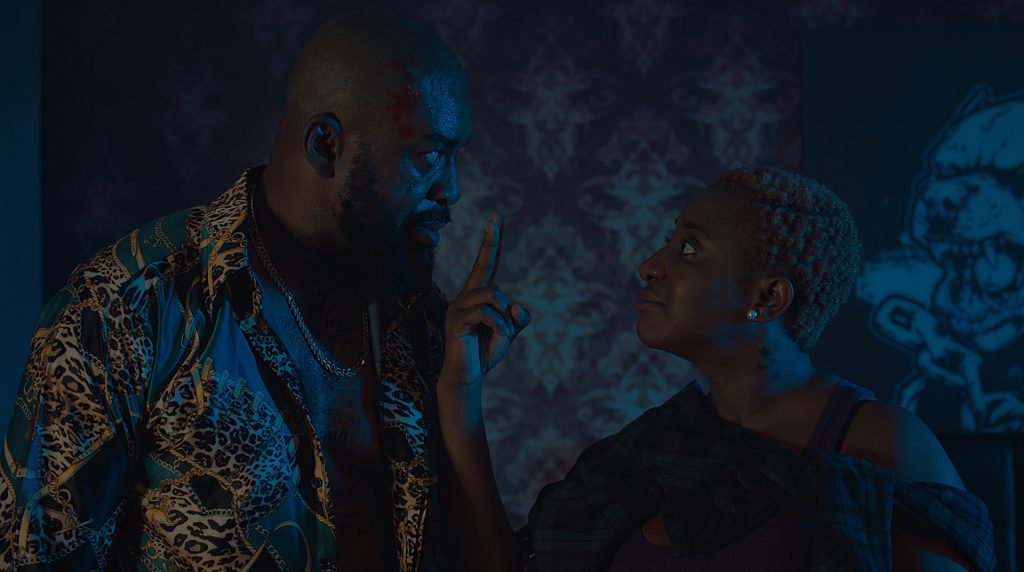Shanty Town wants so much to be seen as proof that Nollywood can do intense crime and action. It wants to be gritty, edgy and explicit like the crime dramas that have gained cult following across the world. But it lacks the insight and skill necessary to make it remarkable.…
By Vivian Nneka Nwajiaku
Let me start by making two observations. The first is this: there’s no such thing as a bad story; only bad execution. The second is that ambition is good, but as with anything else, too much of it is bad. Everything that is wrong with Shanty Town stems from the second arm of each of these observations. In this Nigerian Netflix series, everything that attracts an 18+ rating is thrown in, most of them unwarranted. Maybe if the screenplay was half as good as the show’s pyrotechnics, it’d be a quality watch. But with poor execution, Shanty Town takes a steady slope downhill from its promising opening sequence.
Co-written by Xavier Ighorodje (Foreigner’s God, One Chance) and Donald Tombia (Introducing the Kujus, Strain), and created by Ighorodje and Chichi Nworah (Betty’s Love Triangle, Ex With Benefits), Shanty Town’s story is supposedly that of a group of female sex workers trying to work their way out of the titular Shanty Town, a Lagos slum where they live under the servitude of a vicious kingpin called Scar (Chidi Mokeme). But, of course, Scar won’t let them off so easily. Case in point is Shalewa (Nancy Isime) for whom freedom seems like a pipe dream until her friend, Jackie (Mercy Eke), manages to get her freedom. Motivated, Shalewa dips into her savings and takes a loan from Jackie, so she can pay off the debt her father owes to Scar. But as soon as she settles that debt, Scar takes out a calculator and gives her a very detailed account of the debts she’s racked up since she was brought into Shanty Town. Apparently, the STI treatments, the abortions and all that spiritual protection from Shanty Town’s in-house priestess, Mama T (Sola Sobowale), come at an extra cost.
While everybody else is trying to get out — in reality, Shalewa and Jackie are the only ones who actually do try — there is one woman who is trying to get in. Inem (Ini Edo) is back from prison to reclaim her throne as the leading woman of Shanty Town — a position already being occupied by the town’s queen bee, Ene (Nse Ikpe-Etim), who certainly doesn’t want Inem anywhere near Shanty Town. But we know something she doesn’t. Inem is an undercover agent out to take down Scar.
Meanwhile, Scar is not a free man, either. He answers to Chief Fernandez (Richard Mofe-Damijo), a wealthy politician whose campaign for the office of Governor means that some of their illegal activities have to be shut down, to Scar’s chagrin. As if that’s not enough of a problem for Scar, Dame Dakota (Shaffy Bello) comes into the picture. She wants to be governor, too. So, she compulsorily recruits Scar to help take down the chief, with Chief’s son, Femi (Peter “Mr. P” Okoye), as bait.
(Read also: Four Nollywood Crime Thrillers to Stream After “Blood Sisters” (And Four Coming Soon))
It might sound like an awful lot of things happening, but it’s really not too many things for a series to juggle. There might be some other universe where all of the subplots of Shanty Town actually blend in together and make for a great series. But in this universe, what we have is a directionless series with disjointed plotting, clumsy progression, poor characterisation, and protracted scenes.

All the subplots are in perpetual competition for priority so that every episode might as well be a new show. And what is presented as the main plot — the sex workers’ quest for freedom — gets shoved aside in favour of a spineless political squabble that never goes beyond the surface. Shanty Town positions itself as some revolutionary portrayal of sex work and sex slavery, which, perhaps, was the intention. But in its execution, the series leans more towards objectifying women than properly representing sex workers. It doesn’t pay half enough attention to their stories to warrant even half of the attention it gives to their bodies. It fixates too much on women’s bodies, with the camera persistently lingering on buttocks, breasts and lipstick-coated lips.
Worse still, Shanty Town uses its women’s trauma, over and over again, for shock value. This series spends more than a minute, in the third episode, graphically capturing a sexual assault incident that adds nothing of substance to the plot — whatever the plot is — only to immediately jump along to the next subplot, brushing off the assault with an urgency that none of its scenes has. Then, again in the fourth episode, it goes even farther with a rape that’s particularly brutal and sensationalised. It’s bad enough when sexual violence is used as a plot device. But in Shanty Town, sexual violence is not even as significant as a plot device. It’s simply something that just happens, only having occasional consequences when convenient to the plot.
In fact, things happen just to happen in this series. Perhaps, Shanty Town will remind you of Kemi Adetiba’s King of Boys franchise, especially because of how it links the political class in Lagos with the criminal underworld — plus the cast members they share. But what it really reminds me of is the British crime drama, Gangs of London. And not for the right reasons. Like the British series, Shanty Town is extremely violent just for the sake of being extremely violent. Its plot is just as crowded and disjointed. It also happens to share a handful of tropes with Gangs of London, from an undercover agent to axe fights.
(Read also: Imaginative, Stimulating and Thrilling – Further Consideration of Kemi Adetiba’s King of Boys: The Return of the King)
In Shanty Town, even those tropes happen for the sake of it and not because they fit into the narrative. A vehicle gets flipped, people get shot and Scar gets kidnapped, just so that Dame Dakota can recruit Scar to do a job that she still offers to pay him for, anyway. It’s not as if she can’t just summon him, seeing as she’s the one woman whose authority he recognises. Shalewa is used as some sort of femme fatale with a dilemma that never comes to a head. There’s a whole scene dedicated to a character being forced to use drugs, but nothing is done with that piece of information afterwards. Inem, the upright and supposedly intentional undercover agent, steals money from Scar just so Scar can go on a murderous rampage in search of the thief. And nothing Inem discovers while undercover turns out to be useful at the end of the day. Also, why exactly did the almighty Scar have to engage in that axe fight with a nameless bodyguard? Why did we have to sit through so many unimportant people fighting unimportant battles for so long in the season finale?

Why did we have to sit through any of the six episodes, really? By the end of the series, nothing matters because nothing really changes in Shanty Town. And when it manages to resolve anything, it’s so relentlessly grim that practically every resolution is followed by a return to the status quo. But even that is just a symptom of the show’s over-ambitiousness. Shanty Town wants so much to be seen as proof that Nollywood can do intense crime and action. It wants to be gritty, edgy and explicit like the crime dramas that have gained cult following across the world. But it lacks the insight and skill necessary to make it remarkable. And it shows in the series’ lack of restraint (even its somewhat interesting dialogue is ruined with its overuse of flashy monologues).
(Read also: Brotherhood Review: Jade OsiberuDelivers Quality Fun in Trope-Filled Action Flick)
It’s tempting to blame Shanty Town’s faults on budget. A larger and more diverse writer’s room might have solved some of its screenplay problems. More money might have resulted in better visual effects and a higher production value — the production design is impressive, though — than the series is able to offer. Maybe more money would have allowed for better fight training, so that the fight scenes would not look as rehearsed as they do. But budget is not a very convincing explanation, considering that the show’s entire main cast and a substantial part of its minor cast are industry heavy-weights. Toyin Abraham and Regina Daniels are in the series’ most obscure scene. Debo Macaroni and Omowunmi Dada are credited with roles that barely exist. Zubby Michael, Ali Nuhu and Uche Jombo are ridiculously wasted.
Even the actors cast in major roles, barring a few of them, are still wasted in those roles. Mokeme is excellent as Scar, bringing a controlled viciousness to the character, but also a hint of insecurity. A gift and a skill, he easily makes you hate the character but be in awe of the actor. Isime is convincing as the easily frightened Shalewa eager for a different life. And yet, there’s the sense that the screenplay gives Mokeme and Isime very little space to show their range. Edo and Ikpe-Etim are most credible when their acting involves conversing in Ibibio, but Edo often tries too hard to fit into her character, and Ikpe-Etim is too refined to be in Shanty Town. Mofe-Damijo and Bello are not quite able to rise above the limitations of the caricatures the screenplay foists on them as characters. I have never seen Sobowale so underutisilised in a role. And what could be worse acting than Okoye’s Yoruba character that sounds so very Igbo?
Directed by Dimeji Ajibola (Ratnik, Passport), Shanty Town was initially produced as a movie before it was acquired by Netflix and converted into the series that it is now. Perhaps, it should have stayed a film, but even that really wouldn’t have solved its problems. While it’s difficult to not admire its ambitiousness, Shanty Town is too ambitious for its own good.

Several times during the season finale, Scar growls at his sparring partner “You’ve been showing off, abi?” Well, that’s exactly what the series is doing, too — showing off. And needlessly exposing itself to situations it cannot handle (In this series, a woman is literally butchered just because, but it’s so obvious that the head lying on the ground is not a human head). After all that ambition and that starry cast, all Shanty Town manages to prove is that Chidi Mokeme is still a force to reckon with.
Rating: 2.5/5
(Shanty Town is streaming on Netflix here.)
Vivian Nneka Nwajiaku, a film critic, writer and lawyer, currently writes from Lagos. Connect with her on Twitter @Nneka_Viv and Instagram @_vivian.nneka.




I saw the first episode and knew this was just another shot at them reaching for the stars when they clearly don’t have a space ship. Your review is spot on accurate and funny i was hoping someone gets to see “shanty town” for what it is, not a 5 star performance not even close. Fair you gave 2.5, for me its a solid 1 star act…
It’s a great movie. But pls carefully review befor selling to the general public. Who recorded Jackie’s voice note? Was is the same Jackie that was massacred that still had the chance if sending the long voice note?
Pls step up your game
Yes, Ini Edo only came across convincing when speaking Ibibio, otherwise her acting was terrible though not as bad as Peter Okoye’s. Shafi Bello was too fake in her role, it just didn’t seem believable. Shanty Town tried, but was a mess!
The fight scenes were terrible, Ini Edo was so not believable in the role and Uche Jombo was even worse! RMD wasn’t all that, Shafy Bello was terribly fake, Peter Okoye has no acting skills whatsoever, he had no business even being there. Chidi However gave a good performance. The story was just all over the place! This is one overhyped piece of crap! I would give it a half star!
For me, I would not consider this movie over ambitious but a very great leap for nollywood. Sure this movie has a bit of glitches and all of that but I think they kind of balanced it u know. Like the movie is good and at the same time it crashes in some areas. It’s a 50 50 thing. And for a nollywood action movie not to have bad special effects like the likes of EZENDIALA and co. Come on, Shanty town is almost as good as.breaking bad. The cinematography, the screenplay,the effects, the acting everything’s on point. We have done well. We will continue to do well. One love for SHANTY TOWN 👌👌💓💓👏
I agree with you Vivian Nneka. Shanty town does seem over ambitious. But you have to admit, the actors gave us a banger especially Chidi. I loved the movie. Even though the story wasn’t executed well I feel like it wasn’t all that bad. For me this is the best crime drama Nigeria has to offer seeing how much money and work was put into it. The cinematography is just wow and the effects too. Nollywood finally gave us an action movie, finally. Nigeria actually did a scene were a vehicle actually flips in the air. To think I would be alive to see the day. But even with all av said the film does loose a sense of originality. Anyways it’s a 7/10 for me 😌